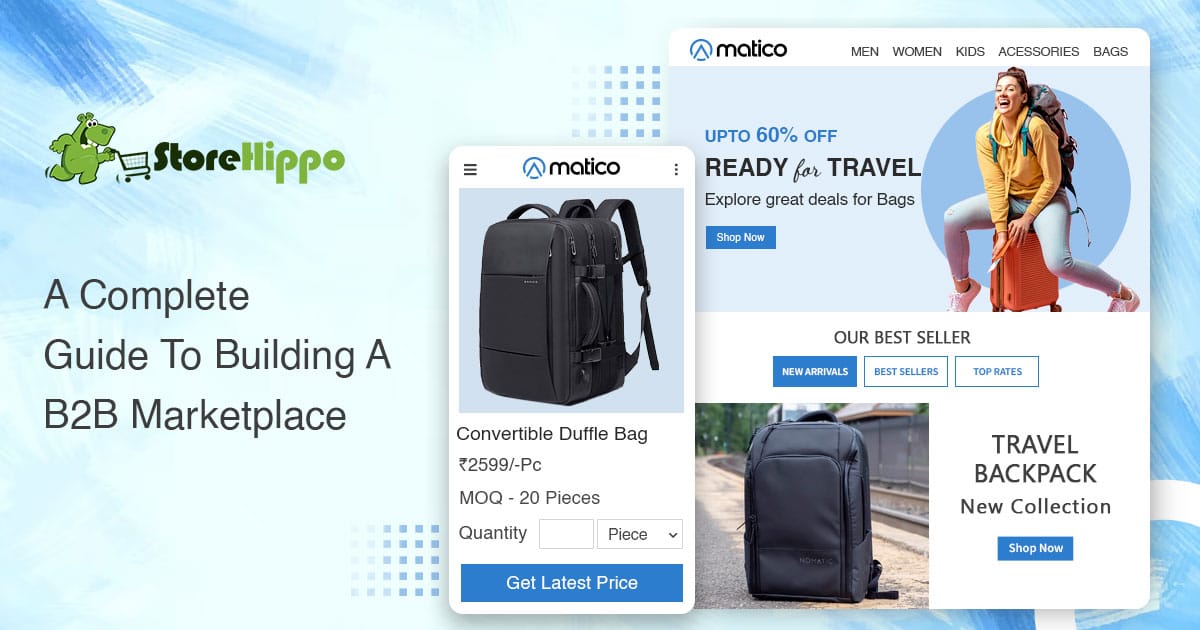The COVID disruptions and crisis response to the unprecedented situations established the B2B marketplace model as a clear winner for business owners, sellers and enterprise customers.
Reports from Gartner and DHL suggest that 80% of B2B sales will be done online by 2025. Interestingly, global B2B multi-seller websites reported 5.3X growth in sales from 2020 to 2022. Also, B2B marketplaces have registered 7.2X faster growth than overall B2B ecommerce. With B2B ecommerce forecasted to grow at a CAGR of 20.2% from 2023-2030, ecommerce will be the prime sales channel for the business-to-business category.
What does all this mean?
You got it!
This is the time for B2B businesses of every scale, size and industry to consider building their own B2B marketplace.

- 5.3X- Growth in B2B marketplace sales from 2020 to 2022
- 7.2X - Faster growth of B2B marketplaces than overall B2B ecommerce
Table of Contents
- A complete guide to building a successful B2B Online Marketplace
- What is a B2B marketplace?
- Why this is the right time to build a B2B Marketplace?
- What are some examples of successful B2B marketplaces?
- Top 5 Indian B2B Marketplace Websites
- What are the different types of B2B marketplaces?
- Types of B2B Marketplace Websites based on their business model
- How does a B2B marketplace work?
- How do B2B marketplaces make money?
- What are the benefits of B2B marketplace for owners, buyers and sellers?
- What are the challenges of building a B2B marketplace?
- Why StoreHippo is the best solution to build a B2B marketplace?
- How to build a B2B marketplace?
- How to onboard the best sellers to make your B2B marketplace successful?
- How to market your B2B marketplace for growth and success?
- Conclusion
- FAQ
A complete guide to building a successful B2B Online Marketplace
If you are also considering B2B marketplace development, this article is going to offer a detailed guide on building a successful B2B marketplace website. In this article, you will get answers to all your queries along with data-driven industry insights to help you make informed decisions about;
- Why building your marketplace is a good idea
- Challenges of building an enterprise marketplace
- Features to look for in your B2B ecommerce solutions
- A step-wise guide to building your B2B marketplace
- How to onboard the best sellers to your marketplace
- How to plan your marketing strategy and many more.
So, without further ado, let’s get started.
What is a B2B marketplace?
A B2B marketplace is a digital portal that brings together B2B buyers and sellers on a common platform. A B2B marketplace website helps businesses/ manufacturers/sellers/distributors etc to connect with and conduct online buying and selling with other businesses. B2B transactions are characterised by bulk transactions for large volumes/quantities of goods.
B2B online marketplaces have made traditional wholesale and enterprise businesses better structured, organised and modernised for all concerned parties. With more and more adoption of the marketplace model, B2B ecommerce is swiftly gravitating towards self-service and faster sales cycle thanks to automation and availability of multiple vendors to start negotiations with.
Why this is the right time to build a B2B Marketplace?
B2B ecommerce market is expected to be worth $20.9 by 2027. The B2B segment was slow to adopt digital commerce but conditioned by B2C experiences and the pandemic push both buyers and sellers in the enterprise wholesale segment are moving towards B2B marketplaces.
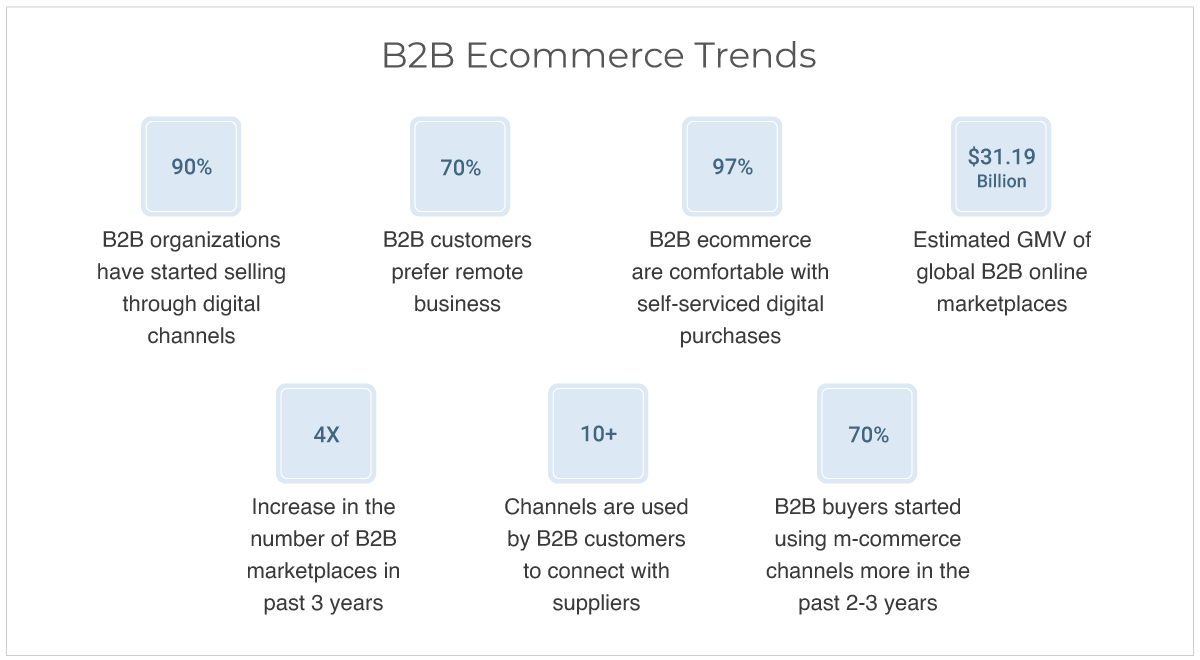
Here are some latest noteworthy trends in the B2B ecommerce segment:
- 90% of B2B organizations have started selling through digital channels
- 70% of B2B customers prefer remote business
- 97% of B2B ecommerce are comfortable with self-serviced digital purchases
- $31.19 billion is the estimated GMV of global B2B online marketplaces
- 4X increase in the number of B2B marketplaces in past 3 years
- 10+ channels are used by B2B customers to connect with suppliers
- 70% of B2B buyers started using m-commerce channels more in the past 2-3 years
Source: Statista, McKinsey & Company, DHL Express
B2B ecommerce is on a steady upward trajectory and marketplaces are driving this growth. Enterprise brands that make a start right now and build their business-to-business marketplace can modernize their business and have better visibility and growth beyond borders.
What are some examples of successful B2B marketplaces?
Enterprise businesses with successful B2B marketplaces have given a push to the wider adoption of ecommerce. By bringing together a variety of sellers
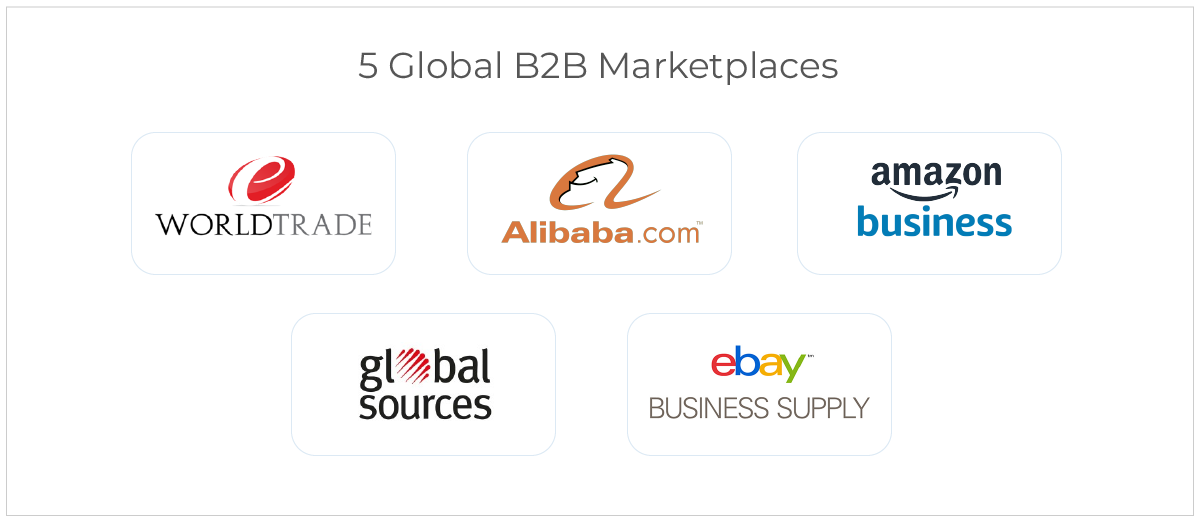
Here are the top 5 global B2B marketplaces:
- eWorltrade global B2B multi-seller platform which connects manufacturers and suppliers from across the world on its marketplace website.
- Alibaba B2B platform makes business easy for manufacturers and suppliers from 190 countries across the globe.
- Amazon Business connects millions of buyers and sellers on its B2B marketplace enabling manufacturers and suppliers to do business under Amazon’s trusted brand name.
- Global Sources is a popular international B2B marketplace website which is a trusted name in the business-to-business segment for 50+ years. Their B2B ecommerce platform has helped many businesses grow in international markets.
- eBay Business Supply upgraded from a C2C platform to a fully B2B ecommerce model and offers a cost-effective solution to buyers and sellers.
Top 5 Indian B2B Marketplace Websites
The market size of B2B ecommerce in India is forecasted to be worth $59.8 billion by 2025, a 10X+ increase since 2021. Successful B2B marketplace portals are at the forefront of this growth.
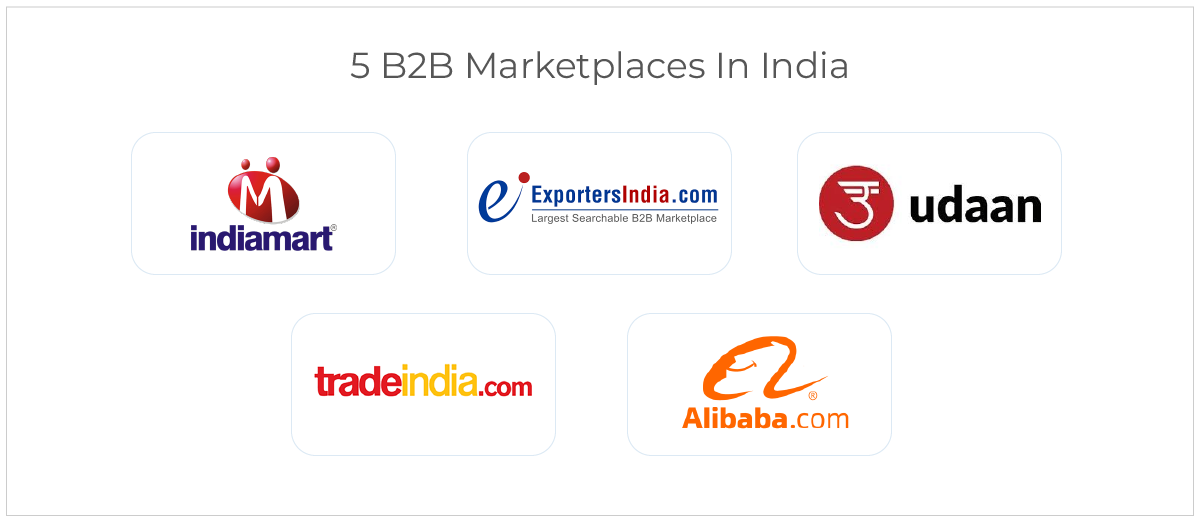
5 successful B2B marketplaces in India are:
- IndiaMART- IndiaMART is India's largest online B2B marketplace, holding 60% share of B2b classified space in India. It promotes efficient trade by connecting buyers with suppliers across various industries.
- ExportersIndia- One of India’s oldest B2B marketplace ExportersIndia specializes in connecting Indian exporters with global buyers to foster international trade.
- Udaan- Launched in 2016, Udaan is a fast-growing B2B wholesale marketplace in India, offering a wide range of products and services to retailers, wholesalers, and manufacturers. Udaan focuses on lifestyle, electronics, FMCG, pharma, home and kitchen, staples, fruits and vegetables, FMCG, pharma, toys and general merchandise categories.
- Tradeindia- Tradeindia was launched in 1996 and since then has been offering a platform for B2B sellers and buyers facilitating seamless transactions and ease of doing business.
- Alibaba India- Alibaba India helps wholesalers, distributors, manufacturers and suppliers in India to showcase and sell their products to global clients via its well known B2B online marketplace.
You can take advantage of the established business model of these successful marketplaces to incorporate features and modules while considering your own B2B marketplace development.
What are the different types of B2B marketplaces?
Business-to-business marketplaces can be broadly categorized on the basis of products/services sold and on their business models. Here is how we can categorize B2B marketplaces:
Info: Types of B2B marketplaces
B2B Multi-Vendor Marketplace based on Products and Services
B2B marketplaces can be categorized into two broad categories depending on the products and services sold on the platform. They are:
Vertical or Niche B2B Marketplace
These marketplaces cater to products and services in one particular industry niche. Buyers and sellers on a niche B2B marketplace deal in products or services from a given industry segment only.
For example, a medicine and pharma B2B marketplace with sellers selling wholesale medicine medical supplies, surgical instruments, surgical instruments, diagnostic apparatus etc.
Horizontal B2B Multi Vendor Marketplace
Unlike niche or vertical marketplaces, a horizontal B2B marketplace has sellers from diverse industries. These sellers sell products and services from a variety of industries which can be related or totally unrelated.
For example, a large B2B online marketplace that has sellers from construction, pharma, automobile, fertilizers, agriculture, gems and jewelry etc. Most of the popular and successful business-to-business marketplace websites like Amazon, Alibaba etc.
Types of B2B Marketplace Websites based on their business model
On the basis of their business model, B2B marketplaces can be further divided into the following types:
Product-based B2B Multi Vendor Marketplace
These marketplaces deal in wholesale or bulk product supply to other businesses. For example, an apparel wholesale seller can sell his products to other retailers on a product-based marketplace.
B2B Service Marketplace
Service marketplaces in the business-to-business category offer connect businesses that offer a variety of services to other businesses. For example, Fiverr connects a variety of service providers on its platform with businesses looking for diverse services.
B2B Hybrid Marketplace
A hybrid type of B2B online marketplace is a platform that caters to both B2B and B2C/D2C clients. Such a marketplace can involve elements like manufacturing, wholesale selling, D2C selling, services etc.
For example, Nykaa is a hybrid B2B marketplace which sells directly to B2C clients and in large quantities to makeup artists and professionals. It also has its own product lines making it a D2C marketplace with multiple stores for different product lines.
Hyperlocal B2B2C Marketplace
In a hyperlocal B2B2C marketplace set up there are various local dealers and distributors of a brand on its own B2B multi vendor marketplace catering to end customers in a hyperlocal set-up.
For example, a milk and dairy brand can have multiple local distributors on its marketplace supplying milk and dairy products to end customers through the marketplace.
Setting up a B2B multi-vendor portal unleashes new growth opportunities for your enterprise brand. However, you need to choose your B2B marketplace development partners with care and due deliberation to ensure you have a scalable, flexible and customizable solution to power your business.
When planning the marketplace website for your enterprise wholesale brand, it becomes essential to consider the business model diligently and then use one of the above or a combination of the above business models for your business. Also, you need to choose a B2B marketplace builder that not only supports your current business model but also enables you to pivot to any new business model seamlessly.
How does a B2B marketplace work?
A business-to-business marketplace works exactly like any other ecommerce marketplace, albeit with flows unique to the B2B model. Here is how a customer looking for office chairs on a wholesale marketplace called “Furniture Hub” will go about his enquiries and final purchase;
Step 1: Client “Sez Infotech” goes to the “Furniture Hub” marketplace websites and looks for suppliers/manufacturers dealing in office chairs.
Step 2: Sez Infotech filters and selects 3 different sellers based on their products and reviews. Sez Infotech sends out an RFQ (request for quotation) for 10 office chairs to 3 different sellers namely Ana & Co., Rockflo Furnitures and Tashie Ergo.
Step 3: After getting the RFQ each of the three sellers respond with their prices for 10 office chairs along with logistics costs, discounts and payment mode etc.
Step 4: The decision-makers at Sez Infotech review the offers sent by the vendors and find Rockflo Furnitures’ deal to be the best in terms of price and product quality. They also get free shipping, 1-year repair warranty and a prolonged payment cycle wherein they have to pay 60% cost upfront and the remaining 40% of the order amount on product delivery.
Step 5: Sez Infotech finalises the order and pays 60% of the order amount using their preferred payment option on the B2B online marketplace.
Step 6: Rockflo Furnitures receives a 60% payment notification and prepares the order of 10 chairs for delivery.
Step 7: Upon order delivery, Sez Infotech makes the remaining payment of 40% amount.
Step 8: “Furniture Hub” admins deduct their commission, say 10% of the final order amount paid by Sez Infotech and release 90% of the order amount to Rockflo Furnitures.
This is a simple example of how B2B sellers and admins complete orders and get their respective share from the sale of products. The sales cycle can have more steps depending on the order volume and final negotiations done between the sellers and the clients.
How do B2B marketplaces make money?
As discussed in the above example, the main source of income for marketplace owners is the commission they get on each order. These commissions can be fixed or percentage-wise and usually vary depending on the seller type and industry type.
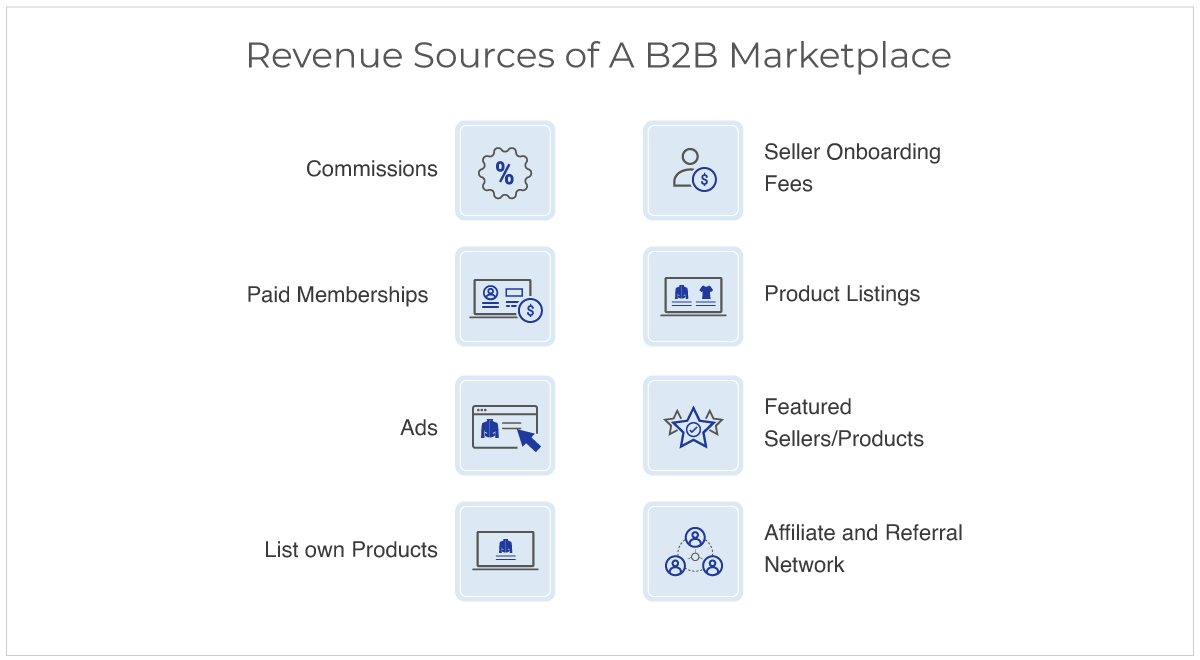
Here are the ways in which B2B marketplaces can make money:
- Commissions: The marketplace can charge different rates of commissions on each order sold on their portal.
- Seller Onboarding Fees: The marketplace brand can charge a one-time or recurring fee from the sellers using its B2B ecommerce platform.
- Paid Memberships: Customers can buy paid or premium memberships to get value-added service while buying from the B2b marketplace. These services can be additional discounts, free shipping etc.
- Product Listings: The multi-seller website can offer premium product placements to its sellers based on certain fees. This can be one of the major revenue sources for the marketplace website.
- Ads: Sellers can be charged for ads of their products ( text ads, video ads, display ads like banners etc.) within the marketplace.
- Featured Sellers/Products: A B2B marketplace can feature certain sellers and their products as bestsellers on its platform and charge a fee for doing so.
- List own Products: The marketplace owners can also manufacture and sell their own products on their multi-vendor platform to earn more from the extensive marketplace set-up.
- Affiliate and Referral Network: Every successful enterprise business has an affiliate network where other businesses promote their products for certain order-based fees. Similarly, referral networks also work by referring your B2B marketplace to prospective customers. Both these networks boost marketplace revenue by bringing more orders.
With so many options to make money without investing in inventory, building a marketplace website is a lucrative business idea for wholesale enterprise brands.
What are the benefits of B2B marketplace for owners, buyers and sellers?
B2B multi-vendor marketplace is a win-win formula for all parties involved. From the owners of the brand to the sellers and buyers, all gain something from this goldmine of opportunities. A marketplace website opens up new markets and possibilities for sellers and buyers by bringing together all parties on a single platform.
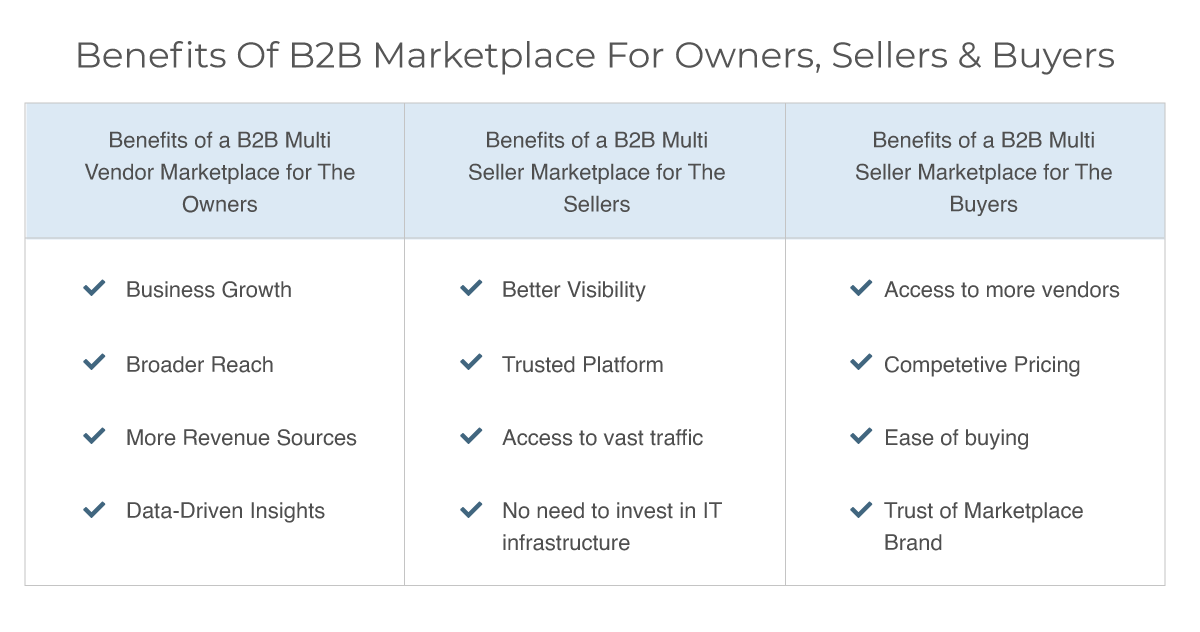
Here is how each concerned party benefits from the marketplace model for B2B:
I ) Benefits of a B2B Multi Vendor Marketplace for The Owners
Here is how business owners benefit by building a business-to-business marketplace:
Business Growth
Business owners get the opportunity to grow their business to new markets and new industry verticals simply by onboarding relevant vendors.
Broader Reach
With multi-channel digital presence enterprises can broaden their reach to new clients and sellers by building brand value through their B2B ecommerce platform.
More Revenue Sources
A marketplace is the perfect opportunity for owners to create multiple revenue streams along with commissions on each order sold on their marketplace website.
Data-Driven Insights
By studying the buyers browsing and buying patterns on the marketplace website and apps brands can get strategic data-driven insights for business growth.
II ) Benefits of a B2B Multi Seller Marketplace for The Sellers
The business-to-business marketplace set up is beneficial for sellers of every size. Here is what the sellers get from selling on a B2B online marketplace:
Better Visibility
Going digital gives sellers better visibility and adds an additional sales channel to their business. With 70% of B2B searches starting online, this means better chances to sell and grow their business.
Trusted Platform
Selling through an established marketplace brand gives the sellers a trusted platform that takes care of many aspects of the business. Right from ensuring data security to protection from fraudulent transactions, sellers benefit from the value associated with the marketplace brand name.
Access to vast traffic
Selling on a B2B online marketplace platform means the sellers get access to a large pre-built traffic of the website. This helps them get more customers and orders right from the time they go online.
No need to invest in IT infrastructure
To start selling digitally, sellers would need to set-up their own website and IT infrastructure. With a ready to use marketplace website and its advanced B2B ecommerce solutions, sellers do not need to spend additionally on the IT infrastructure.
III ) Benefits of a B2B Multi Seller Marketplace for The Buyers
Buying on a marketplace is a good deal for the buyers as well for the following reasons:
Access to more vendors
When buying on a marketplace, buyers get access to multiple vendors and a wide range of products and services on a single platform.
Competetive Pricing
Thanks to multiple vendors, the pricing on the B2B marketplace is competitive and buyers can get the best deals and finalize the vendors based on their ratings and reviews.
Ease of buying
Online marketplaces are designed to facilitate seamless buying. With automation and streamlines, automated ordering process, multiple payment and shipping options buying on a wholesale marketplace becomes much easier.
Trust of Marketplace Brand
The marketplace brand offers a degree of trust which ensures the buyers that they will be getting a fair deal and will be protected against any frauds or quality issues.
Clearly, building a B2B ecommerce marketplace is a win-all formula benefitting the owners as well as the sellers and the buyers.
What are the challenges of building a B2B marketplace?
While building an enterprise marketplace website is a very good idea, planning its execution and rolling out the marketplace website comes with its own set of challenges.
Here are the main challenges faced by enterprise brands while building, running and growing their marketplace website:
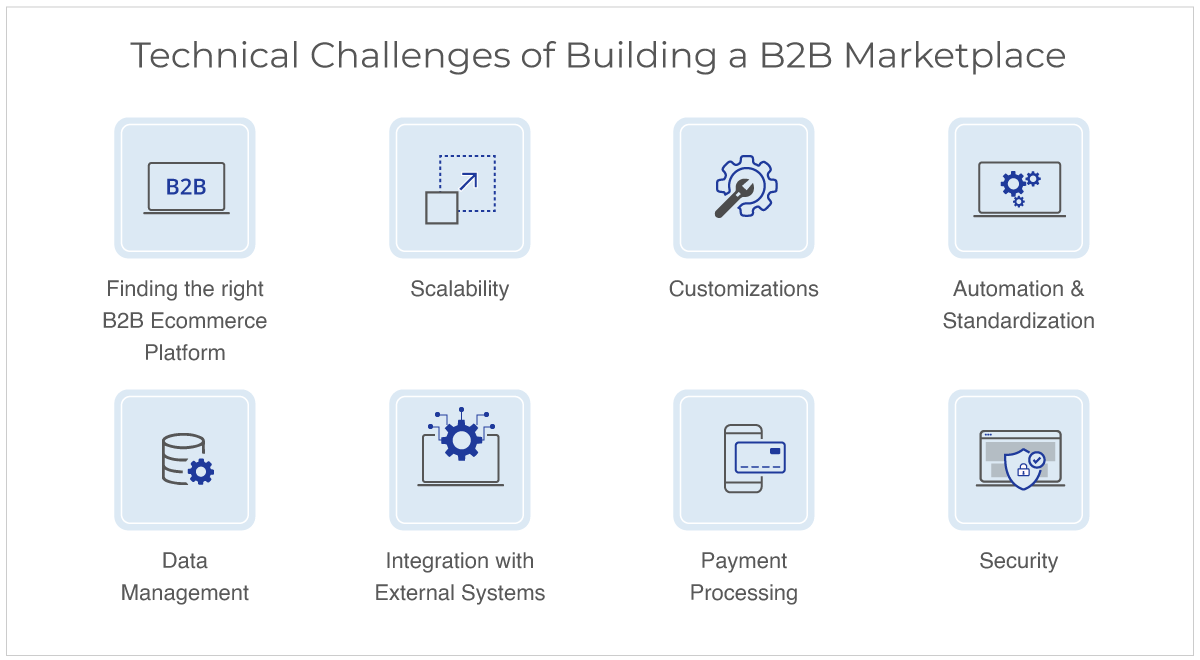
Finding the right B2B Ecommerce Platform
Choosing the right B2B solutions provider or platform can be one of the biggest challenges of building an online marketplace for B2B brands. While you need to consider a solution that can cater to your unique business requirements, you should be careful and choose a stay-on platform that caters to your present business requirements and also is designed to accommodate your future requirements.
Scalability
Scalability is of utmost importance to a B2B marketplace and you should look for a marketplace solution that comes with inherent scalability to take care of your vast vendor pool, product catalogs and also help your brand reach new geo-locations easily.
Customizations
Each enterprise business is unique and needs customized solutions. Getting customizations done on the backend and frontend of your marketplace can be challenging if you do not choose modern B2B ecommerce solutions that facilitate easy customizations.
Automation and Standardization
One of the key benefits of going digital with your B2B business is that it automates processes and introduces standardization across teams and processes. However, to do this you need to have well-defined modules and lots of features in your B2B marketplace builder.
Data Management
B2B marketplaces have to deal with huge data in the form of product listings, user profiles, vendor profiles, high-volume orders, transaction records etc. To handle such vast data, the system should be equipped with a robust and scalable data management system.
Integration with External Systems
A B2B marketplace needs to integrate with lots of third-party systems and service providers not only for their business but also to facilitate seamless business for their vendors. Having seamless integrations with accounting software, ERP solutions, POS, payment gateways etc. goes a long way towards the success of a marketplace website.
Payment Processing
B2B payments are way different and more complex than B2C payments. B2B transactions often involve large sums of money and the payments are also done in parts. For this, the payment solutions, flows and payment gateways should be well aligned to make checkouts frictionless and secure.
Security
B2B marketplaces handle a huge volume of sensitive information and financial transactions. To ensure the website is safe from malware or intentional human data breaches there should be multi-level security measures in place.
To overcome these challenges of building a modern B2B online marketplace you need a future-ready cutting-edge solution like StoreHippo. We have built enterprise business-to-business marketplaces across industry verticals. Whatever the use-case or business requirement of your marketplace website, StoreHippo has a customizable solution that you can tweak for your unique requirements.
Why StoreHippo is the best solution to build a B2B marketplace?
StoreHippo’s advanced B2B marketplace builder is designed to handle all of these technical challenges of building a marketplace website. StoreHippo SaaS-based fully integrated and managed platform is built on MACH architecture which gives enterprises the flexibility and control to build tailor-made solutions for their unique requirements. The cloud-based platform automatically handles the scalability aspect. Thanks to the decoupled headless architecture, brands can build a personalised B2B marketplace and also add multiple customer touchpoints using the same backend logic and APIs.
Integrating with best-in-breed software and solutions providers is also easy because of the StoreHippo B2B ecommerce platform’s API-based architecture. The PCI-DSS-compliant platform comes with a host of security features like authentication, authorisation and audit logs to ensure multi-level security. storeHippo is also integrated with 60+ secure, PCI-compliant payment gateways to ensure secure payments on your enterprise marketplace. With a host of inbuilt B2B features and support for different business models like B2C, D2C, B2B2C, hyperlocal ecommerce etc. Also, StoreHippo comes with multilingual support, multi-currency payments, geo-location-based multiple storefronts, comprehensive multi-vendor solutions etc. to make future-ready B2B online marketplaces for domestic and international markets.
Storehippo plug-and-play solutions do not require additional plugins or paid extensions. With 120+ integrations StoreHippo enables you to make your own ecommerce environment for your unique business needs. You can also integrate with your vendors’ or your business’ unique software and service providers seamlessly.
StoreHippo’s SEO-ready platform comes with a host of inbuilt marketing tools, a discount engine, a blog engine etc. to help you promote your business. You can also integrate with marketing and analytics software ( Google Analytics, Facebook Pixel etc.) of your choice.
With StoreHippo enterprise brands can easily create their custom marketplace and create a niche for their brand.
How to build a B2B marketplace?
Once you have chosen a future-ready marketplace builder like StoreHippo you can build and launch your enterprise B2B multi vendor store in the fastest possible time. You can also tweak the StoreHippo platform inside out to create your unique flows.
Here is how you can build and launch your B2B multi seller portal in no time with StoreHippo:
Step 1: Decide on your business model and list down the features and functionalities your would need in your marketplace website.
Step 2: Take all the statutory clearances and get your paperwork sorted to do business in domestic and global markets (if planned).
Step 3: Connect StoreHippo team of experts to discuss your B2B marketplace requirements, customizations etc. and decide on the final subscription costs.
Step 4: Decide a name for your business and buy the domain.
Step 5: Decide the theme of your B2B marketplace website. Create different landing pages if needed for different industry types of buyer segments. Use StoreHippo’s rich themes library inbuilt drag-and-drop tools to build an engaging website design.
Step 6: Create your vendor registration page to onboard vendors quickly.
Step 7: Give separate vendor dashboards to all the approved vendors so they can run their businesses independently. You get complete visibility and control over all vendor activities through your super-admin dashboard.
Step 8: Integrate all the software ( CRM, ERP, POS, accounting etc.) used by your teams and vendors into your marketplace website.
Step 9: Choose from the existing payment solutions on StoreHippo or add your preferred payment gateways to your B2B marketplace portal. You can also add mobile wallets and credit wallet for B2B payments.
Step 10: Automate the ordering process on your B2B website by adding features like custom forms, RFQ, MOQ, differential pricing, seller-admin-customer chat etc.
Step 11: Build your B2B marketplace app, PWA store etc. using storeHippo’s built-in mobile apps builder. Give built-in mobile admin solutions to your vendors, internal teams, delivery boys etc. to run and manage their business from anywhere anytime.
Step 12: Streamline your logistics using StoreHippo’s 30+ pre-integrated logistics partners. Alternatively, your vendors can use their own fleet of delivery boys and manage them using built-in delivery boy management solutions from StoreHippo.
Step 13: Build a brand presence on various social media platforms to promote your brand through brand pages.
Step 14: Set up multi-channel support for your vendors, sellers, clients etc.
Step 15: Test B2B marketplace using some mock orders and go live.
That’s it your B2b marketplace is up and ready! All you need now is a strategic marketing and good, trusted vendors to build your brand reputation and set your business apart from your competition.
How to onboard the best sellers to make your B2B marketplace successful?
What brings reputation and more buyers to your marketplace? A variety of products, right? And how do you get a rich product catalogue on your marketplace website?
By onboarding more vendors.
To put it simply, it is your network of vendors that grows your business and attracts more buyers to your multi-seller brand. To build a successful brand you need to create value for your buyers as well as sellers.
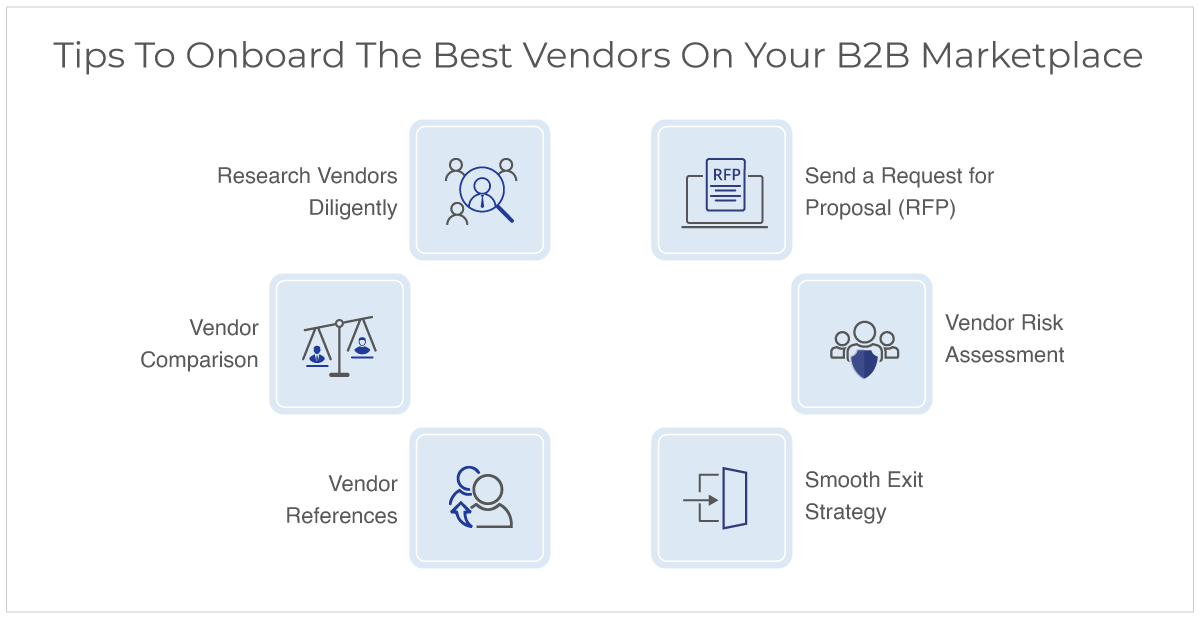
Here is how you can create a successful strategy to onboard the best sellers on your B2B marketplace:
Research Vendors Diligently
Choose your vendors after doing thorough research about their credentials and business. Also, make your policies and terms clear right from the start so your vendors are aligned with your marketplace’s goals and objectives.
Send a Request for Proposal (RFP)
Once your vendors are aligned with your brand’s guidelines and policies, send them an RFP to understand what exactly they propose to offer and how will their presence be of value to your enterprise ecommerce platform.
Vendor Comparison
Your B2B online marketplace will receive applications from vendors in hordes. Compare the vendors, their RFP, business volume, order fulfilment methods etc. before giving go-ahead to the most suitable vendors.
Vendor Risk Assessment
You do not want to put your reputation or your clients through any unwanted ordeal due to the incompetencies or overpromises of your vendors. Set up a matrix and a team for diligent vendor risk assessment to avoid any negative impact on your business.
Vendor References
An established and good vendor can always produce good references for their work from clients or other credible sources in the industry. Check your vendors on social or other platforms and also get their details from industry insiders.
Smooth Exit Strategy
Despite the best checks and guidelines in place, some sellers might not be the right fit for your B2B marketplace. You need to have a well-drafted service requirement and exit strategy to give a smooth exit to not-interested or defaulting (if any) vendors.
Along with these measures in place, you need to make your vendor onboarding process smooth and easy. Offering a feature-rich and easy-to-use platform to your vendors, incentives for bringing more business, simplified taxation, timely payments, easy refund and returns rules, support of logistics etc. go a long way in attracting more vendors to your B2B Marketplace website.
StoreHippo comes with comprehensive solutions that make it easy for your vendors to do business on your marketplace website and this in turn boosts order volume, customer engagement and retention on your website.
Isn’t that the formula to build a successful B2B brand? It sure is!
How to market your B2B marketplace for growth and success?
Once your B2B multi seller website is up and running, its time to market it to new customers. Here is how you can make a strategic marketing planned aimed at accelerating your growth:
- Audience Segmentation: Segment your audiences based on industry, order volume, geography, purchase frequency etc. and build targeted marketing plans for each groups.
- Personalized Marketing: This the era of hyper-personalization. Create custom landing pages, discounts, custom payment and shipping options, customized content etc. to engage and convert your buyers better.
- Go Omnichannel: B2B buyers want their favourite sellers to be on digital channels they frequent during a regular day. By taking your B2B marketplace omnichannel you can boost your visibility and give your sellers more opportunities to convert buyers.
- Develop a Strong Value Proposition: Define and display what sets you apart from your competition. When your clients know why and how your business is beneficial for them, they will prefer your marketplace over others.
- Build Partnerships: Having partnerships with related software or service providers can also help you market and grow your B2B ecommerce platform. For example, you can tie up with payment providers to offer special discounts to buyers using their payment channel.
- Multi-level Discounts: Irrespective of the business model, the lure of discounts is a fail-proof marketing tactic. Play with discounts to engage and convert the customers on your B2b online marketplace.
- Analyse and Strategize: The key to marketing success is analyzing your marketing results based on data and experimenting and fine-tuning your strategies to maximize ROI.
StoreHippo’s feature-rich ecommerce platform comes with built-in marketing tools to help you but strategic marketing plans for your B2B marketplace. You can easily personalise your website for different audience segments using the agility and creative control offered by StoreHippo’s headless ecommerce solutions. Integrating with your chosen marketing software is also a seamless process with StoreHippo.
With the right tools at your disposal, you can build data-driven marketing strategies to make your B2B marketplace successful.
Conclusion
Building a B2B marketplace is a crucial decision for your enterprise brand. While going online has many benefits, shifting your business from offline to online will mean quite an overhaul for your internal teams as well as your current vendors, sellers, distributors etc.
However, to stay ahead of the curve going online and starting your B2B online marketplace is the best decision you can take for your business. B2B ecommerce holds huge potential and customers are also showing a clear preference for digital, self-served buying channels.
With this article, you have a comprehensive guide to help you make informed decisions throughout the process of building your marketplace website. With StoreHippo you have the best B2B ecommerce solutions at your disposal to build an advanced and future-proof wholesale marketplace website and apps.
Ready to get started? Book your free demo with StoreHippo experts to explore our extensive B2B features.
FAQ
1. Are turnkey B2B ecommerce platforms scalable enough to accommodate the rapid growth of enterprise wholesale business in terms of vendors, products, and customer base?
Ans. YES. SaaS-based B2B ecommerce solutions like StoreHippo are built on scalable cloud infrastructure ensuring that your business-to-business marketplace handles increasing traffic, growing product catalogues, and expanding user base without compromising performance or reliability.
With StoreHippo's cloud-based architecture, you get elastic scalability, which implies you can easily scale your resources up or down based on demand, allowing for seamless expansion as your business grows.
Additionally, built on the SaaS model, StoreHippo eliminates the need for costly hardware investments and complex IT infrastructure management, enabling you to focus on growing your B2B marketplace while leveraging a secure and scalable platform.
2. What features and technology should I be looking for in my B2B ecommerce solutions?
Ans: B2B marketplaces are characterized by their nuanced nature, have a distinct sales cycle that tends to be longer compared to their B2C counterparts. Additionally, wholesale/bulk purchases involve a unique and prolonged payment process, often requiring tailored payment solutions customized to the specific needs of business transactions.
To handle such specific business requirements your B2B ecommerce platform should have a host of built-in B2B features that streamline negotiations and final purchase. Also, the technology stack and the platform architecture should be so designed that it not only accommodates the current requirements but also makes room for future needs of the different B2B brands.
With StoreHippo’s decoupled headless architecture, B2B brands can tweak the frontend and the backend easily to build tailored solutions for their business. Cloud infrastructure backed along with API-first set-up enables businesses to go for seamless integrations and create their unique B2B marketplace ecosystem. Additionally, the microservices-based architecture makes the marketplace resilient and aids fault isolation. Marketplace owners can easily replace a faulty component/software and replace it with new one without doing a complete overhaul.
In a nutshell, if you are looking for a future-ready B2B marketplace builder go for the one that comes with built-in B2B features and MACH architecture for better flexibility, agility and creative control.
3. How can we ensure that the B2B ecommerce platform we choose will support customisation to accommodate our unique business requirements and future needs?
Ans: First of all, explore the real-world examples powered by your B2B marketplace development partners. Thoroughly evaluate the use cases they have successfully implemented, building customised solutions that address specific client needs. This will give you an idea of the potential customisations successfully implemented and what you can achieve for your own B2B marketplace.
StoreHippo has powered a variety of B2B multi seller marketplaces for its clients and created tailored solutions for their unique needs. StoreHippo’s flexible and scalable platform allows for extensive customization to meet diverse business requirements. With experience and expertise in catering to international as well as domestic clients across diverse industry verticals, we can effortlessly build tailored solutions for enterprise B2B businesses.
4. Is it possible to manage two or more different business verticals or models using the same B2B ecommerce solutions?
Ans: Yes absolutely. With StoreHippo you can easily create multiple sub stores for different business models or product verticals and manage them from the same central admin.
For example, you can build a store for your B2B business section and another for sub-store for selling your brand’s manufactured goods directly to your end customers through your D2C channel.
You can mix and match different business models to create your own disruptive hybrid business model. Whatever be your business model, StoreHippo can build a tailored marketplace for your enterprise.
5. Will it be possible to design a user-friendly and conversion-oriented user interface quickly?
Ans: Absolutely! With next-gen B2B marketplace development solutions like StoreHippo you build a user-friendly and conversion oriented marketplace website in no time.
StoreHippo offers intuitive and user-friendly design tools to design a website theme in no time. You can use the drag-and-drop and mix and match features to build themes aligned with your buyer preferences and brand tonality. With a visually appealing website and advanced search filters, easy navigation and host of B2B features like RFQ, MOQ, custom forms etc. you can create a B2B marketplace that closes sales faster.
Storehippo also offers support for multilingual themes (including RTL languages) to help you personalize your landing pages for targeted buyer groups. You can also create targeted marketing pages or sub-stores for specific buyer segments.
Additionally, StoreHippo offers device optimized themes, which ensure that your website looks great and performs well across devices. With 70% B2B searches beginning on mobile devices it is crucial to have responsive themes for maximizing conversions. With StoreHippo, you can design a user-friendly and conversion-oriented user interface in no time, and thus attract and retain customers.
